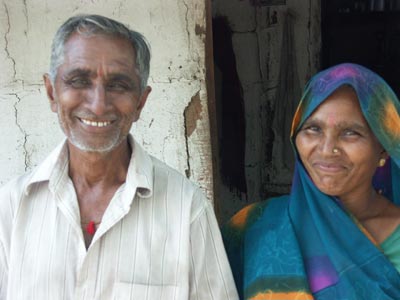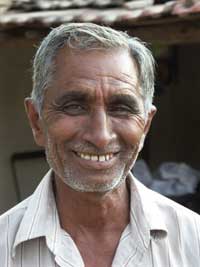Soul Food
Apr 25, 2005 | permalink
He practically doesn't have an income. With his son and wife, he lives in a small, hand-made hut. There's no electricity in their house. All the grains come from their small farm, the drinking water from a well 2 kilometers away, and milk from the cows. Whatever is left over, they try to sell and survive.
That is Udeshi-kaka's situation. Yet when he sees Guri and I walking on the way, he says: "You seem to be God's people. Can you come to our house, our village?" We don't know anything about him, but his sincerity compells us to accept his invitation.
After 3 kilometers on dirt roads, we make it to Ranchodpura, a 40 household village.

Udeshikaka's wife greets us with a genuine smile, but she has a worried look on her face. Her suspicions are confirmed when Udeshikaka tells her: "God has sent us these people today. They are going to eat and stay with us tonight." She gets a little fidgety and fumbles a bit because she knows there isn't enough food in the house; yet she keeps smiling.
Soon enough, we get comfortable with them. They know that we know about the food situation. "Kaki, don't worry about our food. We aren't that hungry. We'll just have what you are having," I tell her. "No, no. We'll make whatever you have," she tells us. Within two minutes, we settle on a simple menu -- rice and daal.
While food is being prepared, we continue talking to Udeshikaka on the "khatlo" outside.
Of all things, Udeshikaka is an infrequent meditator and urges us to go within. "Meditation happens best when it's at 4AM. Everything is quiet. You can go deep within," Udeshi-kaka says while looking around to see if anyone else is listening. Then he whispers, "And when you go within, you see this incredible white light everywhere. You have to merge yourself with that. But you know, we can't talk about this kind of stuff around here. Only those who understand, understand."
Now, it's very difficult to find meditators in India. It's a land of unconditional devotion and prayer, more than anything else. To get a meditation lesson from a random villager, walking down the street is really quite unusual. Guri and I have been meditating daily, but we don't really know much about it ... so we listen to Udeshikaka, with our ears wide open.

In light of his circumstances, Udeshikaka's perspectives are thoroughly inspiring. I don't know many people who would invite "God's people" into their home even when they don't have enough food for their own dinner that night; I don't know many villagers who can give sermons of meditation from first hand experience; I don't know many people who go through intense material discomforts and still say, "My pilgrimage is my life. I am put in these situations, and I have to endure it with a smile."
Lunch is ready. Bunch of rice, very thin daal, and Kaki has made an extra dish, which she calls "prasad". After short, gratitude-filled prayers, Guri and I start eating.
Since I have a sweet tooth, I first toss the "prasad" into my hungry mouth. Much to my surprise, it is very bland. Ah well, that's how they eat it. Both Guri and I keep eating. Within a couple of minutes, Udeshikaka blurts out, "There's no sugar in this prasad." He's embarrassed but he also understands; he looks to his wife and explains, "You have to keep a stable mind. I know you forgot because you were a little stressed out but these are God's people. We have to give them the best we have." Kaki brings her jar of sugar and pours lots of it on our prasad, to make for her honest mistake.
This is a really hard process. In fact, really really hard. At one level, you don't want to take anything from these hand-to-mouth people. But then this is their opportunity of service; whenever I have given up something for others, I have always benefited in the long run. Still, at another level, you don't want to deepen your karmic debt; but then again, you don't know if you are allowing others to be free of their karma. And then, there's my usual -- I just want to give them all the money I have. Or that I'll get a job and give 'em this money. Or the good ol' NGO perspective: let me learn about their situation and help them in a sustained way.
When the universe gives you such a naked gift, you are caught off guard. But I suppose that's the purpose of a pilgrimage.
In truth, all those internal thoughts are confused. We are simply journeying through our own minds. There is no long term, no short term. Udeshikaka is not hungry, my soul is starving. Kaki doesn't need more sugar in her kitchen, I need more love in my heart. Udeshikaka isn't a random meditator we met, I am seeing the reflection of my own mind.
After lunch, Guri and I crash on the floor at Udeshikaka's brother's house (who has a fan, at least while the electricity is running :)). About ten of us are all sleeping in awkward positions around the room and on the front porch. Interestingly enough, we hadn't slept that well for a long time. No worries about luggage, no thoughts about tomorrow, just here and now. "Oddly enough, I feel like I have come home," Guri says right after she wakes up.
Indeed, we are at home in this vast uni-verse.